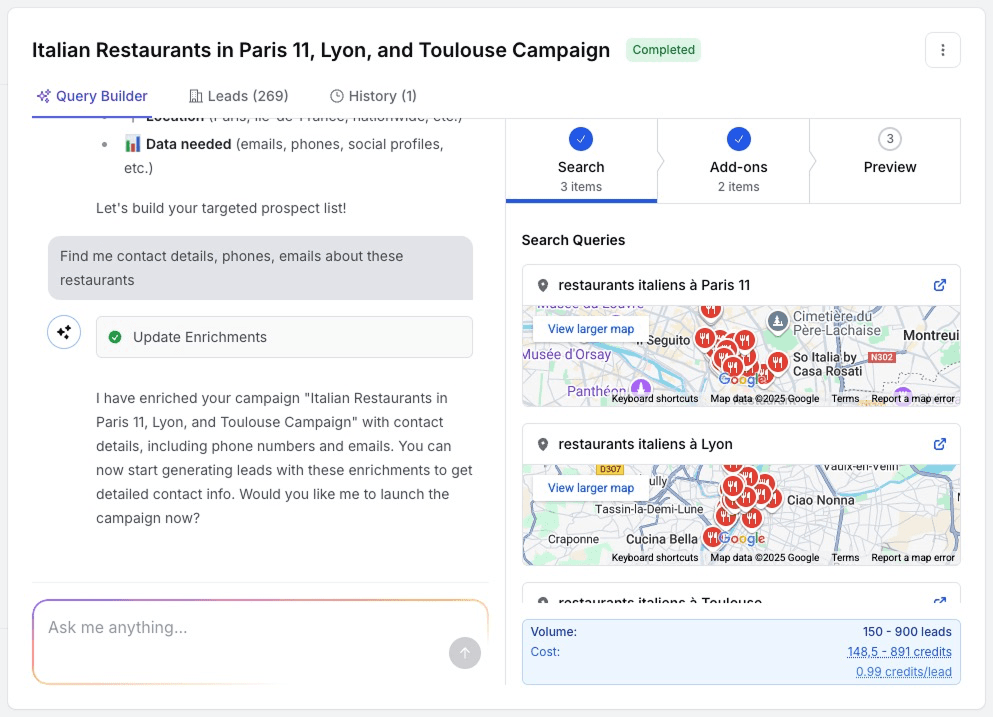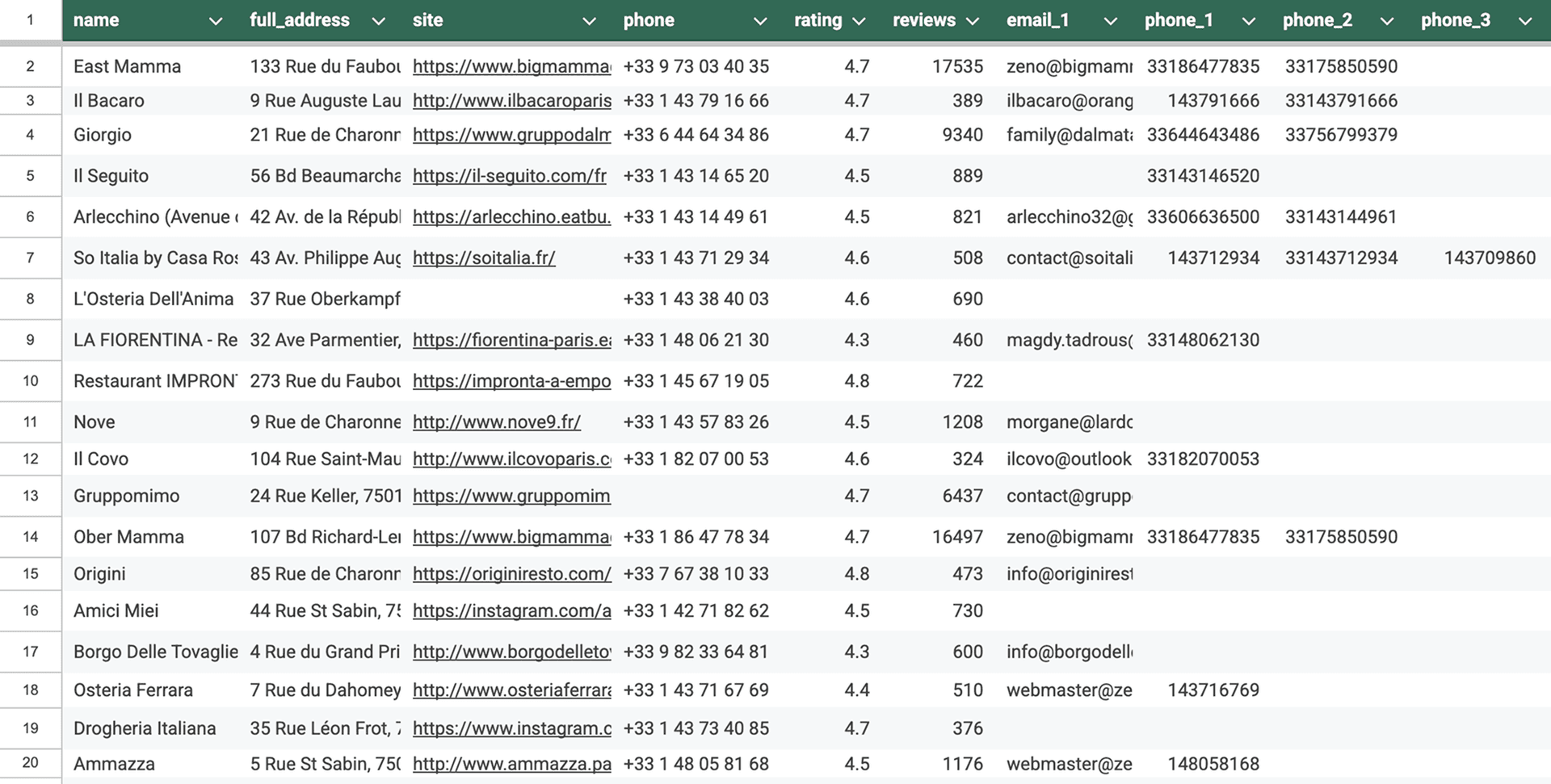How to Generate High-Quality Local Leads for Your Agency
Discover effective strategies and tools to generate qualified local leads for your agency. Learn how to automate lead generation, enrich prospect data, and convert more clients without extensive manual research.
Posted by
Related reading
Comparing Business Enrichment Tools: The Ultimate Guide for 2025
Discover how modern business enrichment tools stack up against each other. Learn about key features, pricing models, data quality, and find out which solution offers the best ROI for your specific needs.
How to Build a Google Maps Business Directory Without Coding Skills
Learn how to create a comprehensive Google Maps business directory without any development skills using AI-powered tools like AskMyBiz that automate data extraction and enrichment.
Building Scalable Business Intelligence Systems
Discover the architecture behind scalable BI systems, including parallel processing, API design, and best practices for large-scale data collection.
Local Lead Generation: The Agency's Blueprint for Growth
For agencies of all types—marketing, web development, SEO, or business consulting—finding qualified local clients consistently is the foundation of sustainable growth. Yet many agencies struggle with inefficient lead generation processes, relying on cold outreach to poorly qualified prospects or expensive third-party lead providers. In this comprehensive guide, I'll share proven strategies and tools to help your agency build a reliable pipeline of high-quality local leads while minimizing the time and resources required.
Why Local Lead Generation Matters for Agencies
Before diving into tactics, let's understand why local lead generation deserves special attention in your agency's growth strategy:
- Higher conversion rates: Prospects in your geographic area are often easier to convert due to the possibility of face-to-face meetings and local credibility.
- Reduced competition: While global agencies compete in crowded markets, local specialists can position themselves as the go-to option in their region.
- Referral potential: Local clients tend to have stronger networks within the community, leading to valuable word-of-mouth referrals.
- Operational efficiency: Serving clients in your area reduces travel time, simplifies meetings, and creates opportunities for bundled services.

Identifying High-Potential Local Lead Sources
The first step in effective local lead generation is knowing where to look. Here are the most valuable sources for agency-client matchmaking:
- Google Maps business listings: A goldmine of information about local businesses, including contact details, size, and operational maturity.
- Business association directories: Chambers of Commerce, industry associations, and business improvement districts maintain member lists.
- Local business publications: "Best of" lists, fastest-growing company rankings, and new business announcements.
- Commercial real estate listings: Identify businesses moving to new locations or expanding their footprint.
- Social media groups: Local business owner communities on Facebook, LinkedIn, and Nextdoor.
While these sources contain valuable information, manually extracting and organizing this data is prohibitively time-consuming. This is where automation comes in.
Automating Local Lead Discovery with AskMyBiz
Modern AI-powered tools have revolutionized local lead generation by automating the most labor-intensive aspects of the process. Here's how to implement an automated approach using AskMyBiz:
- Define your ideal client profile: Use the AI assistant to specify business types, locations, size ranges, and other parameters that match your target audience.
- Generate comprehensive lead lists: The platform automatically extracts business information from Google Maps and other sources based on your criteria.
- Enrich with additional data points: Add contact information, social media profiles, website details, and technical insights to your lead data.
- Export to your preferred format: Get your leads as CSV, Excel, or directly in Google Sheets, ready for immediate outreach or CRM import.
This approach dramatically reduces the time required to build a qualified prospect list. What might take days of manual research can be accomplished in minutes, allowing your team to focus on personalization and outreach.

Qualifying Local Leads: Identifying Sales-Ready Prospects
Not all local businesses make ideal clients. Here are key indicators to look for when qualifying your leads:
- Online presence maturity: Check their website, social profiles, and online reviews to assess their current digital sophistication.
- Growth signals: Recent expansions, job postings, or new locations indicate a business that's investing in growth.
- Competitive landscape: Businesses in crowded markets often need more aggressive marketing and differentiation.
- Service gaps: Identify shortcomings in their current approach that your agency could address.
Modern lead generation tools can help automate much of this qualification process through data enrichment. For example, AskMyBiz can provide website analytics, social media metrics, and business insights that help you prioritize prospects with the highest potential ROI.
Creating Compelling Outreach for Local Businesses
Once you've identified qualified local leads, your outreach approach will determine your conversion success. Here are strategies specifically effective for local businesses:
- Demonstrate local understanding: Reference local market conditions, competition, and community factors relevant to their business.
- Provide a location-specific audit: Offer a free assessment of their local search visibility, reputation, or market positioning.
- Showcase local success stories: Share case studies from similar businesses in their area (non-competitors).
- Leverage community connections: Mention mutual contacts, shared community involvement, or local business group affiliations.
The key to effective local outreach is personalization that demonstrates you've done your homework and understand their specific market context. This is where enriched lead data becomes invaluable.
Scaling Your Local Lead Generation System
As your agency grows, you'll need to scale your lead generation efforts while maintaining quality. Here's how to build a sustainable system:
- Create lead generation workflows: Document your process from targeting to qualification to outreach for consistent execution.
- Implement lead scoring: Develop a quantitative system to prioritize prospects based on fit and readiness.
- Schedule regular prospecting sessions: Dedicate consistent time for lead generation rather than reacting to pipeline emergencies.
- Track conversion metrics: Monitor which lead sources and outreach methods yield the best results.
With the right tools and processes, even a small agency can maintain a healthy pipeline of qualified local leads without dedicating excessive resources to prospecting.

Case Study: How One Agency Generated 50 Qualified Leads in 48 Hours
To illustrate the effectiveness of these approaches, let me share a recent success story from a digital marketing agency client:
The agency, specializing in local SEO and paid search, needed to quickly rebuild their pipeline after several projects concluded simultaneously. Here's their approach:
- Target definition: They identified three business categories that historically converted well: independent law firms, home service contractors, and boutique retail.
- Lead generation: Using AskMyBiz, they generated listings of businesses within these categories across three target cities, resulting in over 200 initial prospects.
- Enrichment and qualification: They added website analytics, social presence data, and contact finder information to identify businesses with established but underoptimized online presences.
- Personalized outreach: For each qualified lead, they created a custom 5-minute video audit highlighting specific opportunities, sending these to decision-makers via email.
The results were impressive: from 50 qualified leads, they secured 12 discovery calls and converted 4 into ongoing clients within two weeks. The entire process required just 8 hours of team time, delivering an exceptional ROI.
Developing a Local Referral Network
While direct outreach is essential, don't overlook the power of local referral networks to generate warm leads:
- Complementary service providers: Identify local businesses that serve the same client base but offer non-competing services.
- Business networking groups: Join location-specific organizations like BNI, chamber of commerce, or industry associations.
- Client referral incentives: Create programs that reward existing clients for introducing new prospects.
- Local thought leadership: Speak at community events, contribute to local publications, or host workshops to establish expertise.
These relationship-based approaches complement your direct lead generation efforts and often result in higher-quality prospects with shorter sales cycles.
Conclusion: Building Your Local Lead Engine
Generating high-quality local leads for your agency doesn't have to be a resource-intensive struggle. By combining targeted data sources, AI-powered automation tools like AskMyBiz, and strategic outreach approaches, you can create a consistent pipeline of qualified prospects without exhausting your team or budget.
The agencies that thrive in today's competitive landscape are those that implement systematic, repeatable lead generation processes rather than relying on ad hoc prospecting or passive referrals. With the strategies outlined in this guide, you have the blueprint to transform your agency's local lead generation from a constant challenge into a predictable engine for growth.
Start by identifying your ideal local client profile, implement the automated tools and processes described here, and consistently refine your approach based on results. Your future clients are already in your local market—it's just a matter of connecting with them effectively.